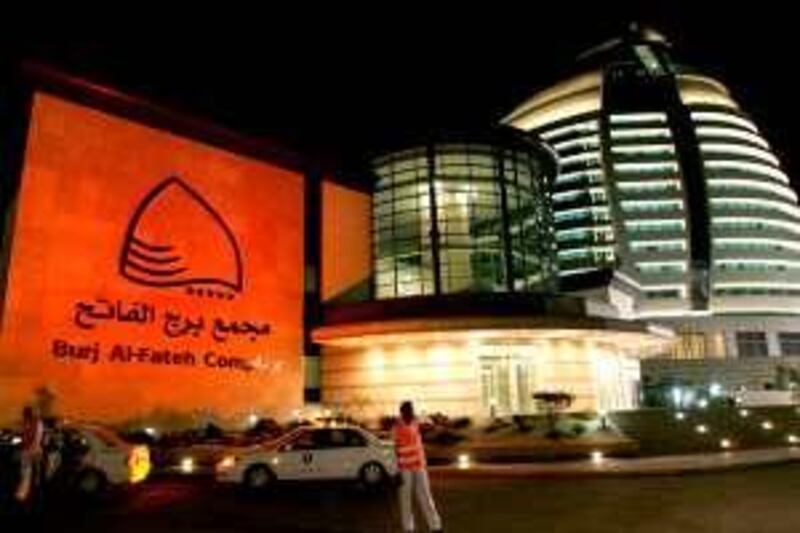Khartoum was for centuries a dusty sprawl of low buildings, but in recent years the skyline of the Sudanese capital has changed. Office blocks and glass-sided towers of apartments have sprung up across the city. Khartoum even has its luxury hotels. With its bulging, sail-shaped outline, the five-star Burj al Fateh would not look out of place on the Dubai waterfront.
Sudan is reaping the dividends of a 2005 peace agreement that brought an end to nearly six decades of civil war. Foreign investors, particularly those from fellow Arab states, have flooded into the country since in search of cheap property. Even as cities such as Dubai and Riyadh struggle through the downturn, the price of properties in Khartoum's upmarket developments has risen to more than US$1,000 (Dh3,672) a square metre.
The UAE is the second largest investor in Sudan after China, with more than $7 billion of investments in the country as of last year. And it is not hard to see the attractions. A one-bedroom flat in Almogran, a vast mixed-use development on a spur of land between the White and Blue Niles, which meet in Khartoum, can sell for as much as $120,000. Quite a markup for a nation where the average yearly salary is about $500.
Yet investment in property is not without its risks, and Sudan has more than its fair share. At least 1.9 million civilians have been killed in fighting between the mainly Muslim north and the Christian and animist south since the 1950s, with the conflict at its bitterest over natural resources such as oil and land that are now being divvied up among foreign stakeholders. Following renewed violence in southern Sudan this month, just how safe are Gulf investments in Africa's largest country?
Outside the oil industry, Emiratis are the most active foreign players in Sudan. The Federal Government has been a particularly important institutional investor, with the state-owned Abu Dhabi Fund for Development granting a $100 million loan last September to the government to support the country's balance of payments. Other projects funded by the Government include a 250-megawatt dam and generating system, to be built in the north.
Private investors have ridden into Khartoum on the coat tails of their government, encouraged by a bilateral deal which allows UAE businesses to repatriate their profits free of tax. Emirati companies also have invested in hotels, banks, cement plants, oil infrastructure and manufacturing, a notable example this year is a $300m deal by the Bin Omeir Holding Group, a private investment group based in Abu Dhabi, to build a sugar refinery.
For the most part, these investments are in the north, where industry and commerce are clustered around Khartoum and the Red Sea city of Port Sudan. Yet increasingly investors are moving into southern Sudan, which bore the brunt of the fighting in the civil war era. Land is what is luring people into rural Sudan, and not bijou plots of commercial real estate either, but great swathes of arable farmland. As part of its policy of food security, Abu Dhabi acquired 30,000 hectares of land last June through its development fund to grow alfalfa, which is used to feed cattle, and other crops such as corn.
Like the governments of neighbouring Saudi Arabia and Bahrain, the UAE is trying to diversify its sources of staple foods to hedge against future crises. And it is not just rich farmland that has investors interested. A company called Al Ain National Wildlife in July leased some 16,800 square kilometres of grassland in south-eastern Sudan, an area roughly a quarter the size of the Abu Dhabi emirate, with a view to operating safaris there.
The stretch of land on the Boma plateau is thought to be second only to the Serengeti region in east Africa for big game. Yet violence is never far away in Sudan. In the south, villagers are harried by fighters from the notorious Lord's Resistance Army (LRA), a rebel group that also operates in neighbouring Uganda and the Democratic Republic of Congo. Inter-tribal violence has also been growing recently in southern Sudan, in areas where the central government and the newly autonomous regional government often have little control.
Tensions are rising across the country in advance of next year's elections, when Omar al Bashir, the president, contests his seat. The International Criminal Court in March indicted Mr al Bashir for war crimes for his role in the conflict in Darfur, where more than 200,000 people have died since 2003 in what the court describes as government-sponsored genocide. But perhaps the biggest test for Sudan comes in 2011, when southerners are due to hold a referendum on whether to form an independent state. With more than 85 per cent of the central government's oil revenues deriving from the south, the northern government of Khartoum is set against secession.
Alhough Mr al Bashir has tried to improve relations with southern leaders in the run-up to the election, the south is now accusing Khartoum of withholding revenues, which are supposed to be divided equally under the 2005 agreement. How long that pact holds remains to be seen. Rising political tensions and increasing lawlessness in the south do not bode well for a peaceful Sudan, or for the foreign investors sinking their cash into this blood-soaked land.
The only hope may be that this investment can bring some measure of prosperity and stability to the country, and prevent it breaking apart. business@thenational.ae





